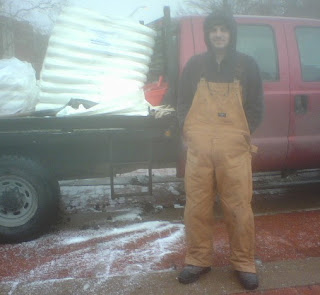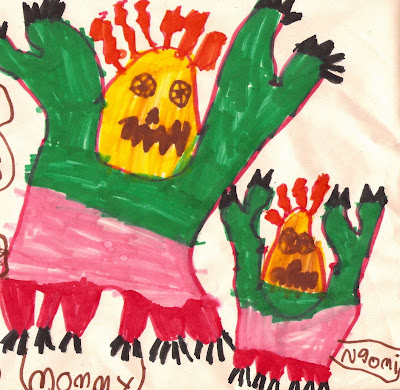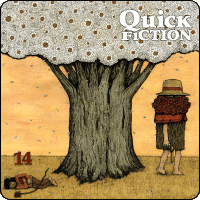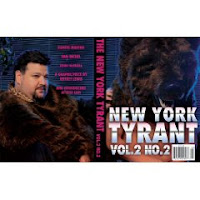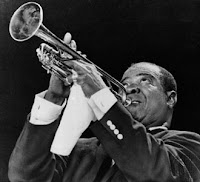I don't submit full-length short stories to web journals.
Why?
Because I don't read full length stories in web journals. Or not much. I read Elizabeth Ellen's
"Fistful" in Dogzplot. I started reading it and couldn't stop. Usually though I can stop. I do stop.
Is it just that you don't like scrolling?
I like to sort of settle into the reading of a full length story. It's a physical thing. I like to have real pages in my hands. I stop reading sometimes, I start thinking about this or that, and when I start reading again my eye knows right where I've left off. That whole stop and start thing -- I don't end up doing that so much in the case of web stories. And l like doing it.
Do you read shorter fictions that same way?
Sometimes. With Kim Chinquee's work sometimes, for example. But generally no. Shorter fictions generally offer a tighter reading experience, is my sense. Too much stopping may mess w/ the flow. That's to say I have no problem reading shorts online, I enjoy doing it. And so I submit shorts to online venues. I usually prefer online venues for shorts, because I see the possibility of a wider audience and a more immediate reaction.
Does everything fall cleanly into one category or the other -- shorts or longer stories?
A thousand words is usually taken as the ceiling for a short, and that makes sense to me. Whatever you've got, if it's under a thousand words, it's short, literally. Between 1000 and 1500 words, though, there seems to be a sort of gray area -- both in terms of form and reading experience -- and I've been thinking a lot about that.
Why?
Well, I've written a few stories within that range lately, and have questions about how to categorize them, where to submit them....
What questions?
If I'm going to get anywhere here, I'll need to be able to refer to some examples -- some good stories between 1000 and 1500 words. I'll start w/ Gene Morgan's
"Die Hard With a Vengeance," from Titular. It's just over 1000 words.
So is the 1000-word mark arbitrary, in the case of this story?
Pretty much, yes. As narrative, this one is 'classic,' in certain ways: right off, you have a clearly defined tension that gives rise to other, more interesting ones. But I read it as a short.
Why?
It's a scene, for one. It starts w/ the start of a happening, it ends w/ the end. It's got that compactness. And though there's more action than you're going to believe, it's 'scenic' action, in a sense. Action that reveals to us the state of things. That's something I associate w/ shorts.
'Scenic action' as opposed to what?
Save that question. Here's the next story I thought to look at: John Lowry's
"The Diary of Li Na," from the Apple Valley Review. It's about 1200 words long. Like "Die Hard," it has kind of classic narrative pull, with immediate tension, but it's not a single scene; a lot of time passes within it. Also, Lowry breaks from the 'and-next-and-next' drive that he establishes to give details that don't technically move things forward, like the one about the dog that the narrator gives away.
So it works more like a longer story?
Not really, not to my mind. It's still very tight. Lowry's narrator doesn't ever seem to sink fully into what's being related. He puts it together for us from the outside, in a crisp telling. And of course it's one long paragraph. So, word count aside, I read this one as a short. On to the next: Tiff Holland's
"Officer Friendly" (from Juked), which is also at about the 1200 word mark, reads more like a full length story to me. Here's the first sentence: "The last time Ray and I broke up, I flew my flag at half mast." Holland's narrator doesn't tell the flag story right off. There's a full immersion into the context. The story is written in expository paragraphs, which gives Holland a chance to explore and give us a pretty rich sense of the narrator as character. And the story doesn't turn out to have much to do w/ flags after all. If you take the first-person narration as a fictively 'actual' communication from the narrator, you might end up wondering if the narrator has tricked herself into revisiting the very private struggle she ends up revisiting here. That's an interesting question because the narrator on the surface seems very poised and frank.... All in all, a rich, complex story.
You wouldn't have sent it to web journals if it had been yours?
Probably not. I'll do one more: Andrea Fitzpatrick's
"Dollface," from Lamination Colony. This one's a little over the 1500 word mark.
So not a short?
I don't read it that way. But it seems like one maybe to begin with. Here's the first sentence: "Our Real Love Dolls™ come certified by discriminating quality professionals." I want to take the story as satire then. Quickly, though, it breaks from that. There's the research scientist's odd aside -- a meditation on pleasure -- whose place in the story becomes fun to consider. Then there's the back and forth between the 'user' and Esmerelda, which is both sharply satirical and not at all. In the end the story is and does different things. It works me as a reader in different (and, taken together, interesting) ways.
Is complexity the distinguishing factor for mid-length or full-length stories then?
Well, shorts can be complex too. Look at Claudia Smith's stuff. But the KIND of complexity.... In the Fitpatrick story, you have different things being explored, in different ways and different sections. As a reader, I'm not ever sure what she's going to do next; the question of how everything fits together is an evolving one. And in the Holland story, you get two distinct and complicated characters, fairly fully drawn. Things between them are developed slowly. Maybe character is really the thing to focus on here. In both these stories, I end up pulling for people -- for the narrator in "Officer Friendly," and in a stranger way for Esmerelda in "Dollface."
And you don't do that in the case of the Morgan and Lowry stories?
Not as much. And not as much, as a reader, in the case of my own recent stories in the 1000-1500 word range. They're not shorts, but neither do they encourage immediate emotional involvement w/ characters.... I may have a hard time placing them.
You said to come back to this one: 'scenic' action as opposed to what?
As opposed to action in the Holland story, where you're put into a interior relationship w/ the character as she deals w/ what she has to deal w/ and does what she does.







